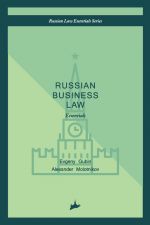Правообладателям!
Представленный фрагмент книги размещен по согласованию с распространителем легального контента ООО "ЛитРес" (не более 20% исходного текста). Если вы считаете, что размещение материала нарушает ваши или чьи-либо права, то сообщите нам об этом.Читателям!
Оплатили, но не знаете что делать дальше?
Текст бизнес-книги "Russian business law: the essentials"
Автор книги: Evgeny Gubin
Раздел: О бизнесе популярно, Бизнес-книги
Текущая страница: 2 (всего у книги 8 страниц)
3. Business Law Evolution
After a brief historical background on the economy and entrepreneurship development in Russia, it is important to become familiarized with the evolution of Russian business law as a science.
The study of the Russian business law originated in the works of the most eminent Russian legal academics of the 18–19th centuries, who connected their lives with MSU. For instance, D. Ushinskiy, an MSU graduate, was the first person who argued for the necessity of defining business law as an independent branch of law. This was a crucial statement for the Russian legal tradition, where the division of law into different branches (areas) was important. This branch system continues to this day, and the reasons including the following: first, each legal scholar focuses his/her research on a specific area of law. The structure of law faculties at Russian universities is based on such a division of law. In 1876, professor N. Nersesov established a department of trade law at MSU, for the purposes of research in the area of business regulation.
Since 1925, the economic-legal department was created in the MSU faculty of USSR law. During the 1920s, the Civil and Land codes were adopted; also, drafts of the Economic, Commercial, Industrial, and Cooperative Codes were developed. The creation and tremendous development of business law was explained by the combined nature of the Soviet economy, and the industrialization of civil law. Moreover, the idea of business law significantly correlated with socialist ideology and the idea of common good. However, the MSU faculty of USSR law was reorganized in 1931.
The revival of teaching business law related to a decree of the Communist Party, dated 1964.[12]12
"On Measures on Further Development of Legal Science and Improvement of Legal Education in the Country."
[Закрыть] The first textbook on business law was developed by a group of authors, supervised by a doctor of legal sciences, Professor V. V. Laptev in 1967.
The final concept of business law was developed by a group of authors from MSU and the Sverdlovsk law institute, supervised by V. P. Gribanov and O. A. Krasavchikov. According to that concept, the business legislation could be recognized as an integrated and complex formation, where norms of different branches of socialist law interacted with regulation of different areas of business activity.
The modern period of business law started after the establishment of the business law and foreign trade regulation department of MSU in 1989, and was later renamed into the business law department in 1992, and headed by Professor A. G. Bykov.[13]13
Eu. P. Gubin, P. G. Lakhno, I. V. Savelyeva were also members of the department.
[Закрыть] After the fall of the USSR and at the beginning of new economy system formation, it was vitally necessary to study business law as a separate branch of law that would regulate legal relationship in a new free market environment.
Currently, the development of Russian business law is led by the MSU Business Law Department with Professor Ev. Gubin, one of the authors of this book, as its Chairman.
4. Entrepreneurship as a Legal Concept, and Business Law Principles
Another important thing to understand regarding specific rules of business law, is the legal approach towards entrepreneurship, along with business law principles.
In the Russian legislation, entrepreneurship is defined as an independent activity, aimed at regular receipt of profit from use of property, product sale, implementation of works, or service delivery carried out at their own risk by persons registered according to the laws (article 2.1 of the Civil Code of the RF). Thus, any activity can be declared entrepreneurship if it has the aforementioned features, in other words, (1) independence, 2) risk character; 3) focus on regular receipt of profit. Although it is not directly indicated in a given definition of entrepreneurship, the word «activity» itself indicates it must be a continuous, regular, not a single act, and be carried out for a more or less a certain time period.
The principles of business law form the basis for being a separate area of law, and determine its unity. The principles of the market economy underlie business law principles, as market relations are the subject of business regulation.
The following principles of business law are usually mentioned by legal scholars,[14]14
See, for example, I. V. Ershova, G. D. Otnykova, Russian Business Law, 2011.
[Закрыть] inter alia: (1) freedom of entrepreneurship, (2) variety and equality of ownership forms, (3) economic space integrity, (4) competition and limitation of monopolistic activity, and (5) state business regulation. These and other principles of business law are explained further in this book.
The principle of entrepreneurship freedom is enshrined by Article 34 of the Constitution of the RF, establishing that “each person has the right to freely use his abilities and property in order to carry out business and other economic activity not prohibited by a law.” The same article of the Constitution bans economic activity aimed at monopolization and unfair competition.
Another important principle relates to state regulation of economy and entrepreneurship. For example, article 71 of the Constitution of the RF includes the following spheres into the jurisdiction of the Russian Federation, inter alia:
(1) federal policies and programs in the area of state, economic, ecological, social, cultural and national development of the Russian Federation;
(2) legal framework of a single market; financial, foreign exchange, credit, and customs regulation, monetization, pricing policy; federal economic services, including federal banks;
(3) federal budget; federal taxes duties; federal funds of regional development;
(4) federal property and its management.
The principle of state regulation is enshrined not only in the Constitution of RF, but also in the constitutions or charters of the Russian Federation constituent territories, federal and local laws, and other legal acts.
Finally, the integrity of the economic space is another core principle of market economy and business law. In accordance with articles 8 and 74 of the Constitution of the RF, the integrity of economic space, free movement of goods, services and financial resources, support for competition, and the freedom of economic activity are guaranteed in the Russian Federation.
Now, our reader has the necessary background. Let your journey to the Russian business law begin! We hope you will enjoy it.
Evgeny Arkhipov[15]15
Lomonosov Moscow State University, PhD candidate, LL. B. 2014.
[Закрыть]
Chapter 1 – Business Legislation
1. Business Legislation
Russia belongs to the Continental (Roman-German) legal family. Statutes (laws) are the main source of law.
1.1. The Hierarchy of Legal Acts Regulating Entrepreneurial ActivitiesThe system of legislation of the Russian Federation consists of three levels: federal, regional (at the level of subjects of the Federation), and local (at the level of municipal entities). At the top of the pyramid of normative acts is the Constitution of the Russian Federation. Moreover, the Russian Federation is a party to several binding international treaties.
The Constitution of Russia sets the areas of competence and powers of the federal and regional governmental bodies in its Articles 71–73. Article 71 of the Russian Constitution lists the procedures by which legal acts can be adopted, solely at the federal level. Article 72 of the Constitution describes the areas in which the regulation can be carried out by both regional and federal acts. Meanwhile, the acts of the regional authorities on such matters shall comply with the acts of the federal authorities. The regional authorities “have full power” on matters not listed in the aforementioned two articles (Article 73 of the Russian Constitution).
Currently, no law on normative legal acts has been adopted in Russia, which is common in several countries. Therefore, the legislative system is not fixed in any act in a complete form. However, separate norms establishing the hierarchy of acts are still available in various sources. With regard to such norms, as well as provisions of the jurisprudence, the schematic system of the normative legal acts in Russia can be explained in the following chart.

An act with a lower legal force should not contradict an act with a higher legal force. If such a contradiction arises, the act with a higher legal force shall be applied.[16]16
Please see below for a more detailed on the correlation between federal and regional acts.
[Закрыть]
In order to be able to precisely identify a specific legal act, the legal acts shall have the following requisites:[17]17
Legal Directory Systems "Consultant Plus" and «Garant» may be used for searching for the texts in Russian of the legal acts of the Russian Federation. The database of these systems is available on the official websites as well: http://www.consultant.ru/online/ and http://www.garant.ru/.
[Закрыть]
i) The type of a legal act
Main types of legal acts: a federal law, a decree, a decision, an order, a command, an instruction, an informative letter.
ii) Adopting body
An adopting body for federal constitutional laws and federal laws is not specified; only the Parliament of the Russian Federation can adopt these acts. Similarly, an adopting body for regional laws is not specified.
iii) The name
Legal acts do not have official abbreviations in Russia. At the same time, in practice the acts that are widely used acquire informal short names. The short names can appear as abbreviations (for example, FL on Joint Stock Companies is called “FL on JSC”).
iv) The date of adoption
The date of adoption of the federal law is the date of the adoption of the law by the State Duma.
v) The number
Sometimes federal laws are simply named by number, for example "law No. 99-FL". However, this method of naming the law does not allow accurate identification of the law. The issue is that the number 1-FZ is assigned to each law adopted, as the first in a row in the current year. The next law that is adopted is assigned the number 2-FZ, and so on. With this method, since 1993, 21 federal laws were adopted with the number 99-FZ. Therefore, for the unambiguous identification of the law, in addition to the number, it is also necessary to know the date (or at least the year) of its adoption. In practice, for reference on a concrete act, it is recommended to use five requisites at a time: the type of the act, the adopted body, the name, the date of adoption, and the number.
vi) The date of the last amendments (edition)
The date of the last amendments is usually specified in brackets.
vii) The source of official publication
The sources of official publication of the federal laws, the acts of the President of the Russian Federation and the Government of the Russian Federation are:
“The Russian Newspaper”
“The Collection of the Legislation of the Russian Federation”
“The Parliamentary Newspaper”
The official internet portal of legal information, at the following website: pravo.gov.ru
The international treaties within the EEU and decisions of the Eurasian Economic Commission are published on the following website: eaeunion.org
The source of official publication is usually separated from the other requisites with a double backslash. In practice, it is usually not indicated.
The reference on a legal act with the use of all its requisites looks like the following:
The Federal Law dated February 8, 1998 No. 14-FZ (edited on 05.05.2014) "On Limited Liability Companies" // "The Collection of the Legislation of the RF", 16.02.1998, No. 7, page 785.
2. The Constitutional Basics of Entrepreneurship
The Constitution of the Russian Federation is at the top of the pyramid of the acts, and it regulates entrepreneurship. It was adopted by national vote on December 12, 1993.
2.1. The Legal Features of the ConstitutionThe main legal features of the Constitution are specified in part 1 of Article 15 of the Constitution of Russia:
The highest legal force of the Constitution means that its norms have a priority over the norms of any other legal acts acting in the territory of Russia. All other acts shall correspond to the Constitution. If a norm enshrined in a federal law contradicts with the provisions of the Constitution, the norm of the Constitution shall apply.
The direct operation of the Constitution means that it is possible to directly refer to its norms for the purposes of legally justifying one’s position.
Despite the fact that republics, which are also called «states» in the Constitution, are part of the Russian Federation, the Constitution also acts in the territory of these subjects of the federation, without any exceptions.
2.2. The Main Provisions of the Constitution, Regulating the Entrepreneurial ActivitiesIn the Russian Federation:
i. Freedom of economic activity is provided (Article 8),
ii. The unity of economic space, free movement of goods, services, and financial means are guaranteed (Article 8),
iii. The support for competition is guaranteed (Article 8), the activity aimed at monopolization and unfair competition is forbidden (Article 34),
iv. The equality of private, state, municipal, and other forms of ownership is established (Article 8),
v. The possibility of finding of land and other natural resources in a private property is guaranteed (Article 9),
vi. The equality of all people before the law and the court is guaranteed (Article 19),
vii. Everyone has the right to free use of his abilities and property for entrepreneurial and other economic activity, not prohibited by law (Article 34),
viii. No one may be deprived of one’s property, with the exception of a court decision. Forced confiscation of the property may be carried out only for state needs, on conditions of preliminary and complete compensation (Article 35),
ix. Everyone has the right to state compensation for the damage caused by unlawful actions (or inaction) of bodies of state authority and their officials (Article 53).
3. International Legal Acts
3.1. The Main International Treaties which the Russian Federation is a party toAccording to the Constitution of the Russian Federation, the generally recognized principles and norms of international law, and the international treaties of the Russian Federation, are a component of its legal system. If an international treaty of the Russian Federation establishes other rules than those envisaged by law, the rules of the international treaty shall be applied (part 4 of Article 15).
The provisions of officially published international treaties of the Russian Federation, which do not require a publication of interstate acts for application thereof, operate directly in the Russian Federation (part 3 of Article 5 of FL on International Treaties). In the case of an absence of an appropriate norm of national legislation, it is permissible to directly refer to such an international treaty for the purposes of justifying one’s position. For the implementation of other provisions of international treaties of the Russian Federation, relevant legal acts are being adopted. Additionally, in some cases, the international treaties of the Russian Federation are subject to ratification (Article 15 of FL on International Treaties). Ratification is a procedure by which the international treaty acquires a legal force in Russia and becomes obligatory for all. Ratification is carried out by the federal law.
3.2. The Acts of the Customs UnionRussia is a member of the Eurasian Economic Union.[18]18
Besides Russia, as of today it also includes Belarus, Kazakhsatan, Armenia and Kyrgyzstan.
[Закрыть] Within the EEU, the Customs Union (hereinafter – CU) functions, which includes bodies that carry out the uniform customs regulation in all participating countries of the CU. The fundamental act of the CU is the Customs Code of the CU.
4. Laws
The two main types of laws in Russia are federal constitutional laws and federal laws.
4.1. Federal Constitutional LawsIn Russia, federal constitutional laws can be adopted only with respect to those matters which under the Constitution require an adoption of a federal constitutional law. In other cases, a federal law is adopted.
The main federal constitutional laws which entrepreneurs may encounter, while doing business in Russia are:
i) FCL on Constitutional Court of the RF;
ii) FCL on Judicial System of the RF;
iii) FCL on Supreme Court of the RF;
iv) FCL on Arbitration Courts in the RF.
4.2. Federal lawsIn comparison with federal constitutional laws, the federal laws have a simpler adoption procedure and less legal force. Therefore, federal laws cannot contradict the federal constitutional laws. In case of a contradiction, the federal constitutional law shall be applied. This rule is not fixed in any normative legal act, but it is generally accepted.
The modern system of sources of law started to form in Russia after the adoption of the Constitution of the Russian Federation in 1993. Such terms like "the federal constitutional law" and "the federal law" were first set in the Constitution. At the same time, in the history of Russia there was a period of two years (from the end of 1991 till the end of 1993) when the Soviet Union had already collapsed, and the new constitution was not yet adopted. The laws being adopted at that time were called as laws of the Russian Federation (laws of the RF), and were not called federal laws.[19]19
By the way, some legal acts of the USSR are still in force in Russia today (to the extent to which they do not contradict to the active Russian legislation).
[Закрыть] Some of those continue to operate until today (for example, Law on Mass Media, Law on Consumer Rights Protection, and the Competition Law). The laws of the RF are of the same legal force as federal laws.
In Russia, the code is a form of a federal law, therefore in case of an absence of special instructions, it has the same legal force as federal laws. However, such instructions are contained in the majority of codes. For instance, paragraph 2 of Clause 2 of Article 3 of Civil Code of the Russian Federation (hereafter CC of the RF) stipulates that the norms of civil law, which are contained in other laws, have to correspond with the CC of the RF. This rule finds confirmation thereof in the judicial practice.
An agreement was concluded by and between an organization (subscriber) and a telecommunication operator, according to which the telecommunication operator provided to the subscriber access to a telephone network. Despite the fact that the agreement was made for an indefinite term, the telecommunication operator refused to prolong its action for the recurrent year. Due to the disconnection from telecommunications, the subscriber addressed the court. The subscriber referred to the following: according to the CC of the RF the agreement of the provision of communication services is public, and therefore the operator could not have terminated it unilaterally. The telecommunication operator claimed that according to the federal law N 126-FZ dated July 7, 2003 "On Communication," such an agreement is public, provided that it has been concluded with a citizen.
The Supreme Court of Arbitration of the Russian Federation considered the case as a supervisory instance. In the Decision of the Supreme Court of Arbitration No. 9548/09, dated October 5, 2009, it was specified that by virtue of paragraph 2 of Clause 2 of Article 3 of the CC of the RF norms of civil law, as is contained in other laws, shall correspond with the CC of the RF. In this regard the provisions of the Federal Law N 126-FZ dated July 7, 2003, "On Communication," which stipulates that the agreement for provision of communication services, concluded with a citizen, is public, and cannot be interpreted as a limiting norm of CC of the RF. Therefore, any agreement of the provision of communication services is public.
At the same time, courts do not always adhere to the rule about the supremacy of norms of the CC of the RF, over the civil norms that are contained in other sources. Thus, courts apply the norms of Articles 6–11 of FL on Transportation-Forwarding Activities, which contradict Article 803 of the CC of the RF. These articles state norms on the responsibility of the forwarding agent under the transportation-forwarding contract. Article 803 of the CC of the RF states that the basis and the extent of responsibility are defined explicitly by the norms of chapter 25 of the CC of the RF. In contradiction to this rule, clause 1 of Article 6 of FL on Transportation-Forwarding Activities, states that the basis and the extent of the responsibility of the forwarding agent are defined not only by the CC of the RF, but also by the FL on Transportation-Forwarding Activities. Furthermore, Clauses 3–5 of Article 6 and Articles 7–11 of the aforementioned law, set a different, more difficult order for bringing the forwarding agent to responsibility, than is provided by the CC of the RF.
The necessity for the application of the mentioned articles of FL on Transportation-Forwarding Activities is also confirmed by the supreme courts (see, for example, the Information Letter No. C5–7/UZ-886 dated March 5, 2003 of the Supreme Court of Arbitration of the RF "About the Federal Law On Transportation-Forwarding Activities).
The core codes for conducting entrepreneurship in Russia are:
i) The Civil Code of the Russian Federation
The CC of the RF consists of four parts,[20]20
In Russia, there is no uniform approach on how to name the components of the articles of legal acts. Usually the largest components of the articles are called “clauses, sections, or parts.” Thus in the CC of the RF and the Tax Code of the RF, larger components are called "sections," (each «section» corresponds to one federal law, which in total forms these codes).
Sections/parts or clauses of the articles of legal acts can be divided into sub-clauses and paragraphs. Meanwhile, the parts of the articles can also be divided into clauses (that is, both the whole article and the «part» of the article can also be divided into "clauses"). Additionally, many secondary legal acts are divided into clauses, and articles therein are missing.
In order to define how the concrete element of the article is correctly named, it is necessary to find (in the same legal act), references to an element of an article of the same level (see, for example, Clause 2 of Article 3 of the CC of the RF).
[Закрыть] each of which is considered as a separate federal law. However, these four laws make a uniform code. Under the term “the civil code,” all four parts thereof are regarded. The numbering of all articles of the code is continuous.
The CC of the RF is the basis of the civil legislation which “defines the legal status of the participants of the civil turnover, the grounds of emergence, and the procedure of the implementation of property rights and other real rights, rights for the results of intellectual activity, and means of individualization (of intellectual rights) equated to them, regulates the relations connected with the participation of corporate organizations or with their management (the corporate relations), contractual and other obligations, and also other property and personal non-property relations based on equality, an autonomy of will, and property independence of participants,” (clause 1 of Article 2 of the Civil Code of the RF).
ii) The Civil Procedure Code of the RF
The Civil Procedure Code of the RF regulates the procedure of civil legal proceedings in the courts of general jurisdiction.
iii) The Arbitration Procedural Code of the RF
The Arbitration Procedural Code of the RF regulates the legal proceedings form in the arbitration courts. The arbitration courts in the Russian Federation administer jurisdiction in the sphere of entrepreneurial and other economic activity (Article of 1 Arbitration Procedural Code of the RF).
iv) The Tax Code of the RF
The Tax Code of the RF, as well as the CC of the RF, consists of several parts which represent separate federal laws, but collectively form a uniform code. However, unlike the CC of the RF, there are two parts (not four parts) in the Tax Code of the RF.
The Tax Code of the RF stipulates the basis of the legislation on taxes and levies which regulates "relations of power with respect to the establishment, introduction, and collection of taxes and levies in the Russian Federation, as well as the relations which arise in the process of exercising tax control, and appealing against acts of tax authorities and the actions (and inaction) of their officials, and imposing sanctions for the tax offences," (Article 2 of the Tax Code of the RF).
Other federal laws on taxes and levies have to correspond with the Tax Code of the RF (Clause 1 of Article 1 of the Tax Code of the RF).
v) The Land Code of the RF
The Land Code of the RF regulates the relations on the use and protection of lands in the Russian Federation.
The norm of the land law, as contained in other federal laws, in laws of the subjects of the Russian Federation have to correspond with the Land Code of the RF (paragraph 2, Clause 1 of Article 2 of the Land Code of the RF).
vi) The Labor Code of the RF
The Labor Code of the RF is the basic law regulating the relations between the employee and the employer, as well as between the employer and the state.
The norms of the labor law, as contained in other federal laws, have to correspond with the Labor Code of the RF (Part 3 of Article 5 of the Labor Code of the RF).
vii) The Criminal Code of the RF
The Criminal Code of the RF provides for criminal liability for serious offenses/crimes. The criminal liability for different deeds can be established only by the Criminal Code of the RF.
viii) The Criminal Procedure Code of the RF
The Criminal Procedure Code of the RF regulates the procedure for criminal legal proceedings in the courts.
ix) The Code of Administrative Offences of the RF
The Code of Administrative Offences of the RF provides for administrative responsibility for the deeds listed therein, and lists the bodies which are authorized to consider cases of administrative offenses. It also regulates the proceedings, as well as the execution of decisions on cases of administrative offenses.
Unlike the Criminal Code of the RF, the Code of Administrative Offences of the RF does not contain an exhaustive list of deeds which result in administrative responsibility. The structures of administrative offenses and sanctions thereof are fixed in other legal acts as well. Thus, part 1 of Article 34 of the FL on Protection of Competition provides for the possibility of compulsory liquidation of the organization, in case it was created without receiving a prior consent of antimonopoly authority, provided that the necessity of receiving such consent is defined by the law. Additionally, the administrative responsibility can be established by the laws of the subjects of the Russian Federation.
Правообладателям!
Представленный фрагмент книги размещен по согласованию с распространителем легального контента ООО "ЛитРес" (не более 20% исходного текста). Если вы считаете, что размещение материала нарушает ваши или чьи-либо права, то сообщите нам об этом.Читателям!
Оплатили, но не знаете что делать дальше?






